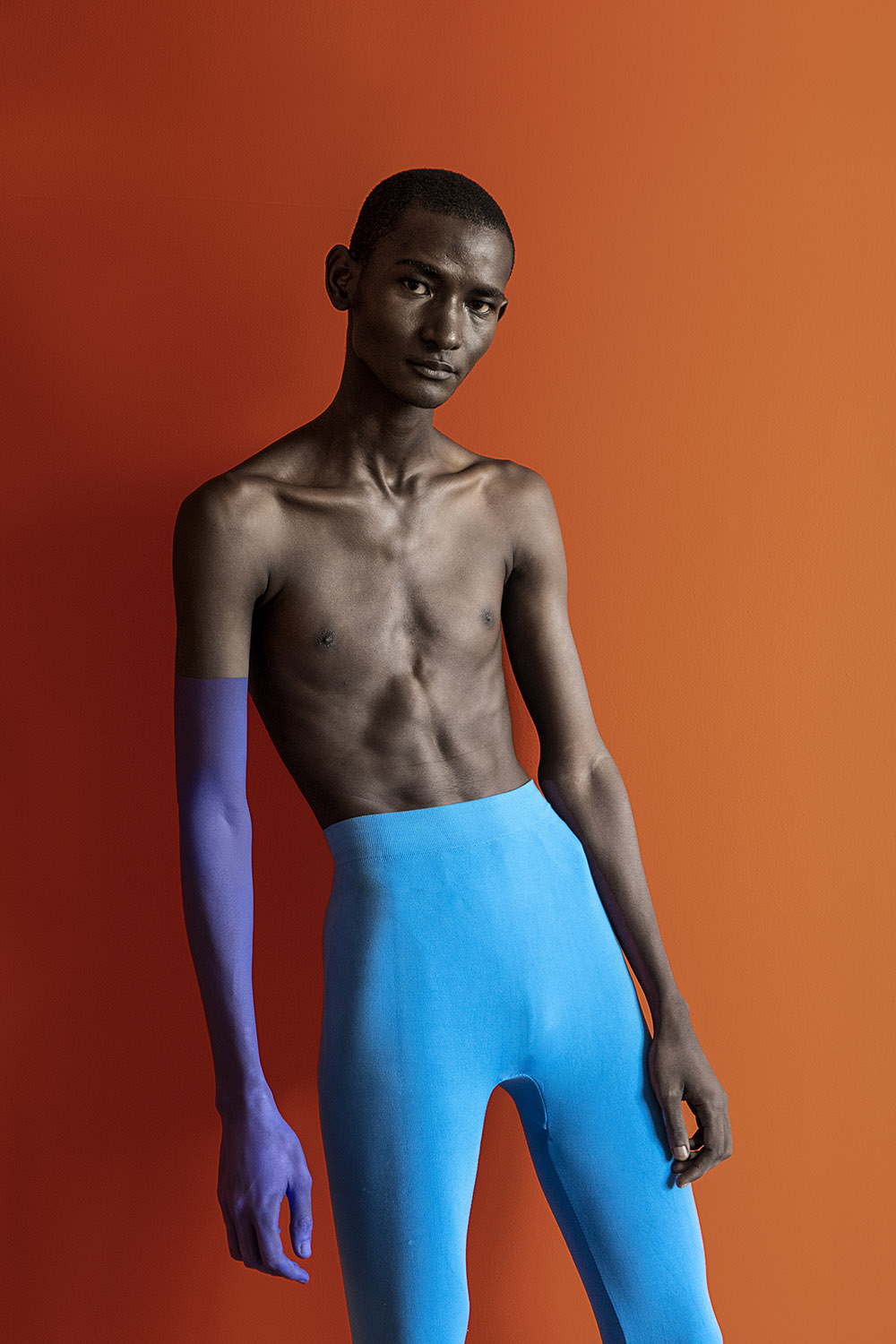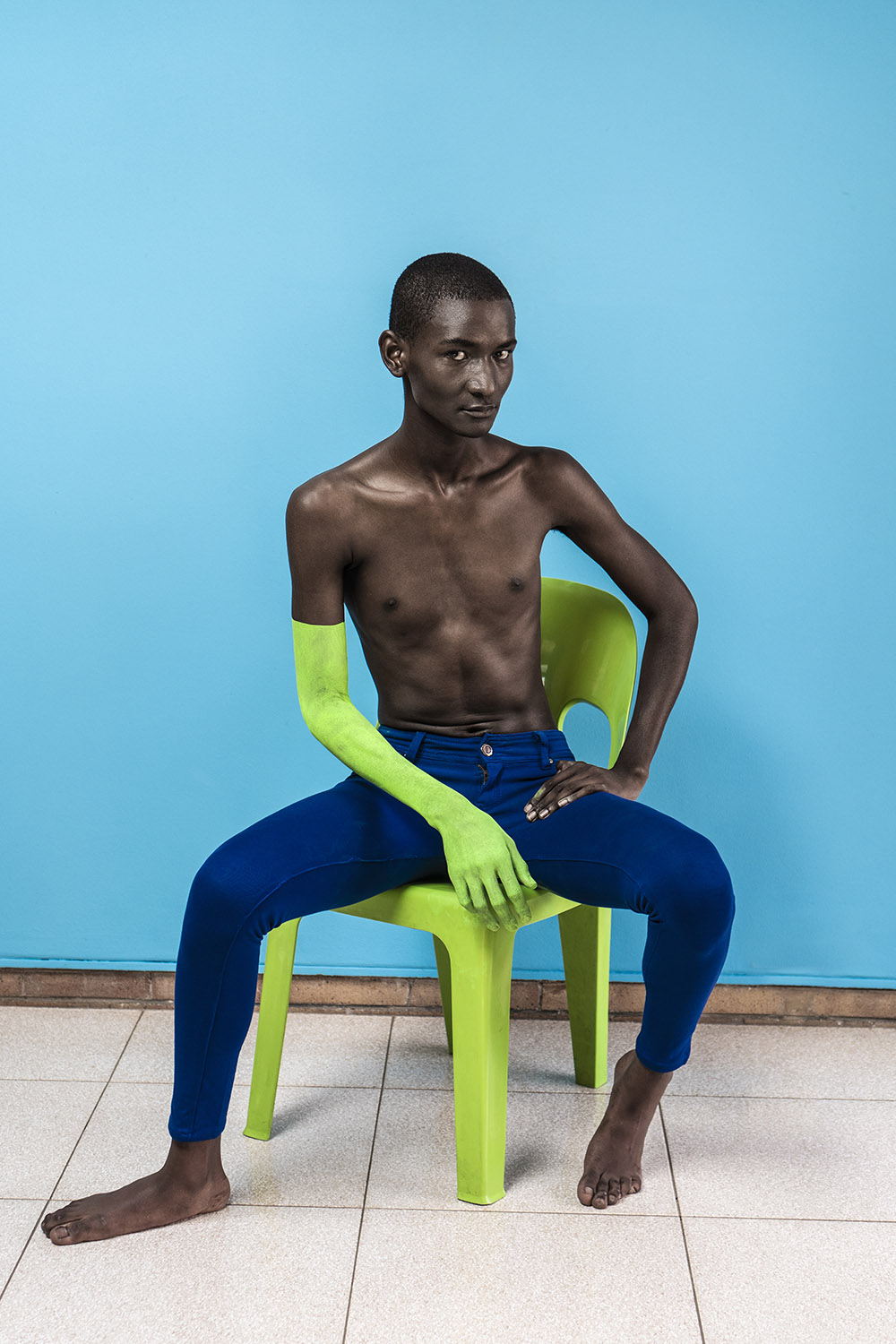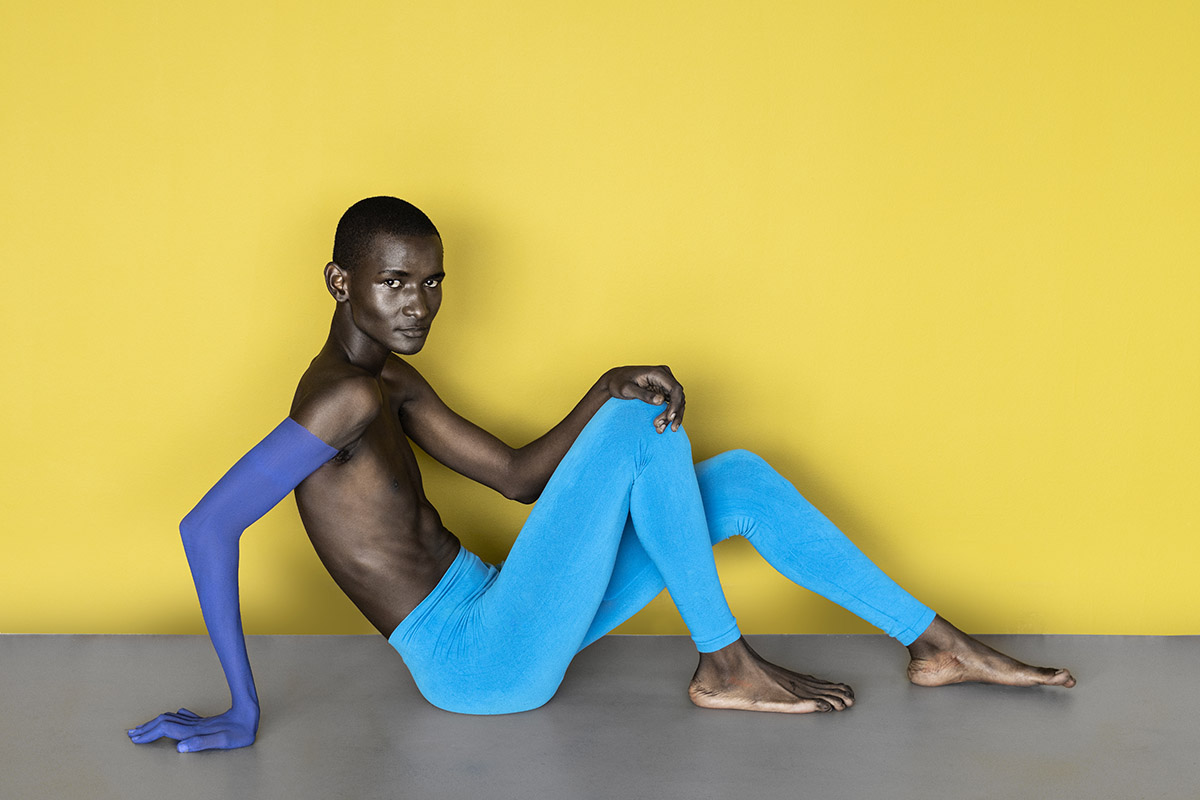Posing a challenge to the racist archetypes of the black South African man by exploring the character of the “tsotsi” is an earlier work ‘Simunye’. The tsotsi, commonly regarded as a “dodgy character” has come to be determined by race. The black person is dehumanized and seen as black before their personhood is acknowledged. Yet white bodies remain raceless. A work biographical in nature the artist felt alienated from his own personhood and body as a result of the continuation of such negative stereotypes. As a means of embracing the self and taking back pride the artist plays with shadow by leaving the faces of his sitters in darkness. ‘Simunye’ a work that can be considered as an Afro-Surrealist expression, now sets the tone for Jamal Nxedlana’s latest photographic offering.
Muscular bodies, lean and fit, intimately share a frame with eye drawing colours such as yellow, green and blue. Their dark complexions glow with majesty. Frozen in a moment that speaks to the fluid nature of time and life itself – life is not viewed as a binary. A magical realism unfolds. The question creeps up as to if this is a reflection of reality or if these images have been manipulated as the work dances between what is real and what is hyper real. This idea of an unsettling unreality is further pushed by near shadowless silhouettes and tights of the same colour as the painted body parts – the tights appear as though they are painted onto the subject’s frame.
The painted hands and feet are near separate from the body becoming their own entity as if amputated. Amputation leading to societal views of disfigurement, acts as a symbol of the censorship of black bodies. Skin is the primary discussion Nxedlana is opening with this work with his colour drops creating images of dis-ease (yellow) and tension (red). Blackness is seen as a symbol of marginalisation.
Africa and its people was and remains a reservoir for the dreams, fantasies and utopias of the West. It must be articulated that this colonial modernity is a fabrication – an order that has been enforced. If viewed from the French philosophical viewpoint then ‘modernity’ (‘western’) is disciplined, hierarchical and measured while Africanness, blackness is viewed as primitive, mysterious, excessive, labyrinthine. It is so that “the West” has constructed views of itself and have underwritten and animated edifices of the “other”.

The colonial present peeks its head out in both “culture” and “economy” sharing a space comfortably. Cultural colonialism and its entanglements with economy remain as rigid foundations of a deeply skewed world economy.
As William Faulkner expresses in writing about the American South, “The past is not dead, it is not even past” and so it is here as well, the past is NOT past.
There is a nostalgia that remains as the nucleus has drifted from “present futures to present pasts.” This drift is characterised by what has come to be known as postcolonialism. Postcolonialism’s sustained effort towards a future eradicated of colonial power is maintained partly by criticism of the continuities of the colonial present and past. Regardless of distortion and denial, the abilities inherent within the colonial past are shockingly re-weaponized in the colonial present. The critical histories of colonialism infect the geopolitics and political economy of asymmetrical development.
Culture underpins power in the same way that power expands culture. Colonialism is more than a political or economic entanglement that finds its footing through dogmas of racism or progression. Colonialism is a deep seated cultural process with its apparent “discoveries” and transgressions fuelled by symbols, metaphors and narratives. What was regarded by these voyeurs as their moments of profit and purity exerted oftentimes with violence has been mediated by forms of meaning. Colonial cultures are more than beliefs that mystify oppression, they express colonial relationships in and of themselves. Derek Gregory asks the important question, “Who assumes the power to represent others as other and on what basis?” This double play of power results in the idea of postcolonialism to be processed as both a political and intellectual enterprise.

Postcolonialism has a fundamental belonging in colonialism. Nostalgia, remembrance. Revisiting the colonial past postcolonialism retrieves the corpse of colonialism. Colonial past – amnesia. Terry Eagleton refers to this as “the inability to remember and the incapacity to do anything else.” Combine these feelings with “culture” and “power” a memory of arts intersects and play a part in the construction of the colonial present.
What lay forgotten is the excruciating violence of the colonial. The exactions, suppressions and complicities that were forced upon the persons it subjugated. These unforgivable acts meant that they were unable to make their own history and ensured that they had to construct a history under conditions that were not of their own choosing. Erasing this is not only delusional but dangerous. In doing so the performance of the colonial present suffocates.
Our cultural expressions are tainted by mourning for the death of “the traditional” what is “authentic” and “unspoiled”. It can be observed in fashion, film, art, design, literature, travel, music. This “traditional” way of creation, is longed for and romanticized and commodified as Graham Huggan calls it “the post colonial exotic.”
This should not be regarded as harmless as this nostalgia becomes a suspension of culture. Derek Gregory explains, “Other cultures are fixed and frozen, often as a series of fetishes, and then brought back to life through metropolitan circuits of consumption.”

Then there is the more violent face of colonial nostalgia. Contemporary metropolitan cultures are known for their nostalgia towards the power and privileges of colonialism. Its execution might have been followed with guilt and its codes transgressed. Yet the heroic show of colonialism and its “ornamentalism” (David Cannadine) and ethnocentric consummation of Right are aggressively present today. Again, Derek Gregory brings up the following important notion “For what else is the war on terror other than the violent return of the colonial past, with its split geographies of ‘us’ and ‘them’, ‘Civilization’ and ‘barbarism,’ ‘Good’ and ‘Evil’?”
The late modern chase of memory-work, the desire to establish a connection between the past and the present is a result of contemporary notions of time and space that have been recomposed to fuse between “us” and “them”.
It is suggested by Hence Huyssen that this turn to memory is as a result of wanting to find stability in a world that displays itself as increasingly in a vertigo of time as well as fractured in lived space. Colonialism is as much about establishing the geographies of others as it is about making their histories.
It is precisely this to which Nxedlana motions, the colonial present and the grotesque façade of its nostalgia. The past has resurfaced to haunt the everyday. In his 1956 essay for Présence Africaine, Jacques Stephen Alexis wrote the following, “What, then, is the marvellous, except the imagery in which a people wraps its experience, reflects its conception of the world and of life, its faith, its hope, its confidence in man, in a great justice, and the explanation which it finds for the forces antagonistic to progress?”
The work thus expresses the surreality of the black experience. A situation that is supposedly comfortable is made near garish by painting limbs and as mentioned earlier signifying amputation. This amputation is a symbolic amputation that reflects the dis-ease of living in a colonial present and may also reflect the asymmetrical development of geographies and disfigurement within the African context. Presenting us with a reality so real that it can only be constituted as a hyper reality a rupture comes to the fore making of the old the new.
Neo-colonialism moulds the underlying metaphysics of white supremacist patriarchy. We must adopt a mind-set and a progressive politics that is fundamentally anticolonialist and dethrones cultural imperialism. We must surrender participation in hierarchical domination and the performance of the colonial present we have in individual as well as group privilege. “The fierce willingness to repudiate domination in a holistic manner is the starting point for progressive cultural revolution.” – Bell Hooks.
References:
[1] Bell Hooks, Outlaw Culture, Routledge, 1994 [2] Derek Gregory, the Colonial Present, Blackwell, 2004 [3] Lanre Bakare, From Beyoncé to Sorry to Bother You: the new age of Afro-Surrealism, The Guardian, 2018


















































